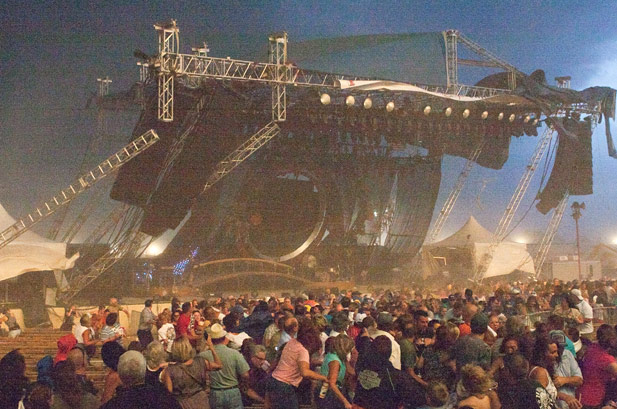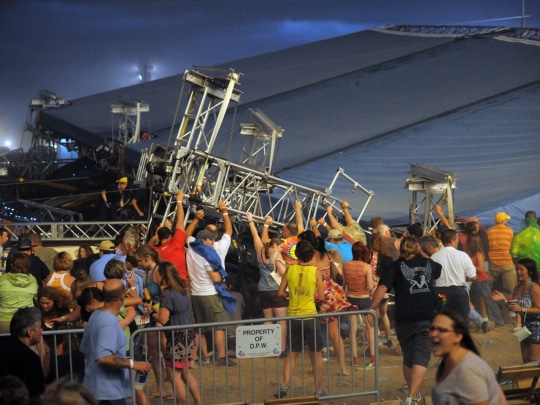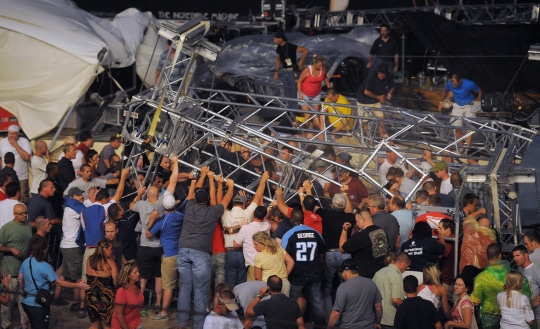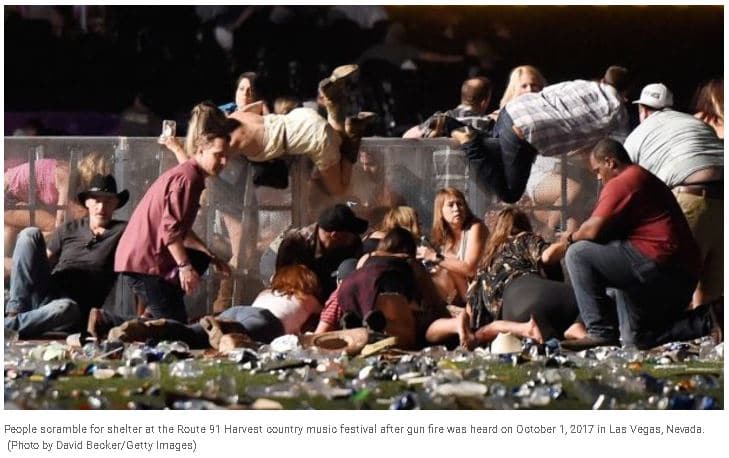

More news from the giant clusterf*ck that is the collapse of the Sugarland rig at the Indiana State Fair a few years ago… seven people killed by falling equipment and truss, and more than fifty injured, as you can imagine. Honestly, nothing surprises me nowadays when it comes to this stuff, I mean for feck’s sake — Indiana just passed a law allowing for the discrimination of gays, so really, there’s no surprise anywhere.
Let’s watch that clip again, shall we?
Seems like more than a few years ago now… events like this shaping the future of our business, as they should, as we all try to stop them from ever happening again. We can at least try to do it here in the USA, where we have more control over how things go down, at least on the production site.

- Mid America’s rig crashes in 2011 due to several factors, weather and construction being two majors
- Mid America Sound claims it had an indemnification clause with the State of Indiana. This means that Mid America SOund claims it had an agreement with the State of Indiana to cover any and all legal defense costs in the event that a nightmare like this took place.
- State of Indiana says “no, you did not have that indemnification.” State sues Mid America Sound.
- March 2014: Marion County Judge Theodore Sosin ruled against Mid America Sound and for the State Fair Commission. Mid America Sound disagreed, and appealed.
- An Appeals court overturned this decision:
Monday, the Court of Appeals reversed Judge Sosin’s order, noting that he did not explain the reasoning for his decision.The majority opinion for the Court of Appeals says the Tort Claims Act does not apply here to limit the state’s financial exposure. The justices said there are other “genuine issues of fact regarding the validity and enforceability” of the agreement between Mid-America and the State Fair Commission. It is those issues they are ordering to be sorted out by the trial court.Chief Judge Nancy Vaidik filed an eight-and-a-half page dissenting opinion. She says she questions whether the indemnity clauses are enforceable because they were on the back of an unsigned invoice, and that she believes this is kind of situation Indiana’s tort claim law was intended to address.
“I believe that this case is nothing more than Mid-America’s attempt to shift tort liability to the Commission — a tort in contract’s clothing, if you will,” Vaidik wrote.
Crazy, no? Also kind of amazing was the limit that the State itself placed on Tort claims for victims of this nightmare. Way to go, Indiana! Hate the gays AND make sure that you have limits in place for paying people for the DEATHS of their loved ones. You’re a winner in somebody’s book I’m sure, Indiana.

The article from WTHR, Channel 13 News, read it in its entirety here:
Indiana Attorney General Greg Zoeller says he plans to appeal to the Indiana Supreme Court a state Court of Appeals ruling that could leave taxpayers on the hook for millions of dollars more in damages from the 2011 stage collapse at the Indiana State Fair.
In a 2-to-1 decision, the justices determined the state may be responsible for the civil liability and legal defense of Mid-America Sound, the company that constructed the stage rigging. The Court of Appeals ordered the issue back to the trial court for further consideration.
The issue arises out of a civil lawsuit filed by victims of the stage collapse or representatives of their estates against Mid-America Sound and other companies and people involved in the August 13, 2011 concert. The country group Sugarland was preparing to take the stage when powerful winds knocked down the stage rigging. It collapsed into the crowd, killing seven people and injuring more than 50 others.
Mid-America Sound claims it had a contractual agreement with the state for indemnification, meaning that Mid-America contends the state agreed to take financial responsibility for any civil liability and legal defense of the private company.
The Indiana State Fair Commission disagreed.
Zoeller issued a statement saying he “strenuously” disagreed with the Court of Appeals ruling. “Our position is Indiana law is clear that the State cannot indemnify a private party, nor was there any agreement here to do so, and we will continue to fight the stage rigging contractor’s attempt to shift its legal responsibility for the State Fair tragedy onto the public,” Zoeller wrote.
Attorneys from Zoeller’s office made several arguments against Mid-America Sound, including that the indemnity provisions were “unconscionable” and “violated the Indiana Tort Claims Act.” The state also claimed that any such agreement was outside the commission’s authority. The attorney general’s office says indemnity for Mid-America would expose the State to an undetermined amount of damages, which is goes against the tort rules.
In March 2014, Marion County Judge Theodore Sosin ruled against Mid-America and in favor of the Indiana State Fair Commission, saying the state is not responsible for indemnifying the private company.
Mid-America Sound appealed that decision.
Monday, the Court of Appeals reversed Judge Sosin’s order, noting that he did not explain the reasoning for his decision.
The majority opinion for the Court of Appeals says the Tort Claims Act does not apply here to limit the state’s financial exposure. The justices said there are other “genuine issues of fact regarding the validity and enforceability” of the agreement between Mid-America and the State Fair Commission. It is those issues they are ordering to be sorted out by the trial court.
Chief Judge Nancy Vaidik filed an eight-and-a-half page dissenting opinion. She says she questions whether the indemnity clauses are enforceable because they were on the back of an unsigned invoice, and that she believes this is kind of situation Indiana’s tort claim law was intended to address.
“I believe that this case is nothing more than Mid-America’s attempt to shift tort liability to the Commission — a tort in contract’s clothing, if you will,” Vaidik wrote.
The Attorney General’s response to the Court of Appeals ruling notes that the State already paid collapse victims up to the statutory limits. In December 2011, the State paid $5 million, the maximum allowed under Indiana’s tort claim act. In 2012, state legislators approved another $6 million to help compensate victims and that money was distributed in December 2012.
Who knows what will happen now… it’s up to the courts to waste time and let this drag on forever. Stay tuned.





The State’s claim is not that different from many other government entities’ position on injuries. This is called Sovereign Immunity in some jurisdictions and comes from the premise that the State (or municipality) can’t be forced into indebtedness because the State is the people. The simple way to avoid this situation is to have insurance, and for the insurance companies to work with their clients to make sure they are providing a safe level of services so they won’t have to pay-out against claims. Easier said than done.
The unfortunate side of this is that most entities operating under Sovereign Immunity (like public schools) just figure “they can’t sue me”, so they shrug-off efforts for safer venues and proper staff training. Other States that do allow themselves to be sued tend to take a closer look at these situations and also have their employees individually insured against liability.
Don’t assume you can or can’t be sued. Know you venue’s policies, understand your contracts, and have your insurance company review your contracts. The days of “Oh, yeah, I’ll do sound for you tonight for fifty bucks and all the beer I can drink” are long gone. They call it Show BUSINESS for a reason.
Also, support the ESA and use the Event Safety Guide to plan your projects safely. Get your copy of the ESG today at http://www.EventSafetyAlliance.org
Comments are closed.